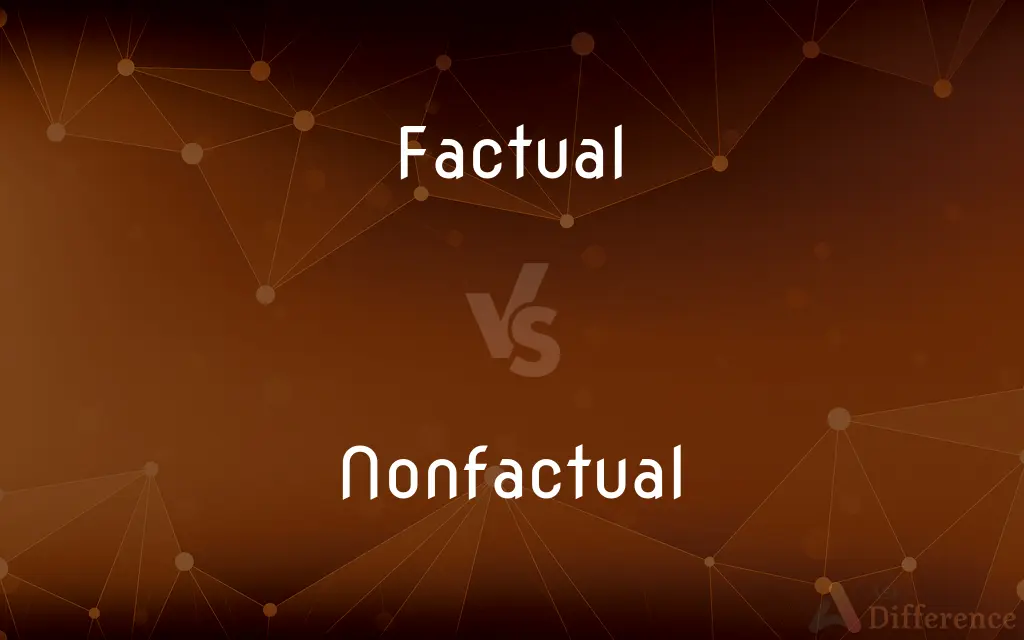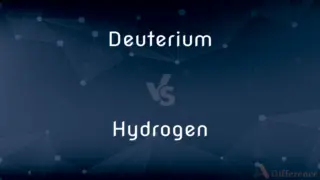Factual vs. Nonfactual — What's the Difference?
By Urooj Arif & Maham Liaqat — Updated on April 5, 2024
Factual content is based on evidence and truth, while nonfactual leans on opinions, beliefs, or fiction.

Difference Between Factual and Nonfactual
Table of Contents
ADVERTISEMENT
Key Differences
Factual statements rely on objective evidence and verifiable data, emphasizing truth and accuracy. These are commonly found in scientific research, historical documentation, and news reporting, where precision and reliability are paramount. For example, a factual statement might be, "The Earth orbits the Sun," which is supported by astronomical evidence. On the other hand, nonfactual statements are based on subjective opinions, beliefs, imagination, or unverified claims. These are prevalent in literature, personal blogs, opinion pieces, and some types of advertising. A nonfactual statement might express a personal belief or preference, such as "Vanilla is the best ice cream flavor," which cannot be objectively verified.
Factual content often aims to inform, educate, or report and is crucial in academic, scientific, and informative contexts. It's used to build knowledge, support arguments, and make informed decisions. Conversely, nonfactual content primarily seeks to persuade, entertain, or express. It's valuable in creative writing, persuasive essays, and subjective discussions where personal perspectives and imaginative elements are celebrated.
Accuracy and credibility are key components, as factual information must be correct and supported by evidence. The emphasis is on emotional appeal, narrative, and personal viewpoint rather than objective truth.
The distinction between factual and nonfactual is also critical in the evaluation of sources and information. For critical thinking and informed decision-making, distinguishing between factual accuracy and subjective opinion is essential. This differentiation helps in assessing the reliability and purpose of the content encountered.
Comparison Chart
Basis
Evidence and truth
Opinions, beliefs, or fiction
ADVERTISEMENT
Purpose
Inform, educate, report
Persuade, entertain, express
Examples
Scientific findings, news reports
Novels, opinion pieces
Verification
Can be verified with evidence
Cannot be objectively verified
Importance
Crucial for informed decision-making
Key for creativity and personal expression
Compare with Definitions
Factual
Verifiable by observation or evidence.
Factual data from experiments can lead to groundbreaking scientific discoveries.
Nonfactual
Derived from or influenced by personal feelings, tastes, or opinions.
His nonfactual commentary added a personal touch to the article.
Factual
Representing information without distortion by personal feelings.
The journalist strived for a factual presentation of the news.
Nonfactual
Involving elements of fiction or fantasy.
The book's nonfactual elements made it a thrilling read.
Factual
Concerned with what is actually true rather than interpretations.
The documentary aimed to present a factual account of the historical event.
Nonfactual
Not intended to be taken literally or as a factual representation.
The advertisement used nonfactual exaggerations to grab attention.
Factual
Not influenced by emotions or personal feelings.
Her factual approach to the debate helped clarify many misunderstandings.
Nonfactual
Reflecting a subjective point of view.
Her review was heavily nonfactual, focusing on personal experiences and feelings.
Factual
Relating to facts; based on evidence.
Factual statements in a research paper provide a solid foundation for the study.
Nonfactual
Not based on facts or evidence.
Nonfactual stories captivate readers with their imaginative worlds.
Factual
Concerned with what is actually the case
A mixture of comment and factual information
Nonfactual
Not factual; false or fictional.
Factual
Of the nature of fact; real.
Factual
Of or containing facts.
Factual
Pertaining to or consisting of objective claims.
Factual
True, accurate, corresponding to reality.
Factual
Of or pertaining to facts; as, factual inaccuracies.
Factual
Containing only facts (as contrasted with opinions or speculations); as, a factual report.
Factual
Of the nature of fact; having actual existence;
Rocks and trees...the actual world
Actual heroism
The actual things that produced the emotion you experienced
Factual
Of or relating to or characterized by facts;
Factual considerations
Factual
Existing in fact whether with lawful authority or not;
De facto segregation is as real as segration imposed by law
A de facto state of war
Factual
Based on fact;
Factual accuracy
A factual account
Factual
Characterized by fact;
The factual aspects of the case
Common Curiosities
How can you verify if something is factual?
Something is factual if it can be supported by objective evidence, reliable sources, or direct observation.
Why is distinguishing between factual and nonfactual important?
It helps in evaluating the reliability of information, supporting critical thinking, and making informed decisions.
Can a text contain both factual and nonfactual elements?
Yes, many texts, especially in journalism and academic writing, blend factual information with nonfactual analysis or interpretation.
Is nonfactual content considered false or unreliable?
Not necessarily. Nonfactual content is often based on personal opinions, beliefs, or creative elements, which serve different purposes than factual content.
Are opinions considered nonfactual?
Yes, opinions are considered nonfactual because they are based on personal beliefs or feelings rather than objective evidence.
What is a factual statement?
A factual statement is one that can be proven to be true or false based on evidence or facts.
Why might someone prefer nonfactual content?
People might prefer nonfactual content for its creative, imaginative, or personal elements, which provide entertainment or resonate with personal beliefs.
How does social media affect the spread of factual and nonfactual information?
Social media can rapidly disseminate both types of information, making it crucial for users to critically evaluate sources and content.
What role do factual statements play in education?
Factual statements provide a foundation for learning and understanding by presenting information that is accurate and verifiable.
Can historical narratives be both factual and nonfactual?
Historical narratives often combine factual events with nonfactual interpretations or perspectives, making them a mix of both.
How do factual and nonfactual content differ in purpose?
Factual content aims to inform or educate based on truth, while nonfactual content may seek to entertain, persuade, or express personal viewpoints.
Is scientific research always factual?
Scientific research aims to be factual by relying on empirical evidence and methodologies, but interpretations can introduce nonfactual elements.
Can a fact become nonfactual over time?
What is considered factual can change with new evidence or understanding, but this is a refinement of facts rather than a transition to nonfactual.
How do cultures impact the perception of factual vs. nonfactual?
Cultural beliefs and values can influence what is accepted as factual or nonfactual, affecting interpretations and understandings.
Are documentaries always factual?
Documentaries aim to be factual by presenting information based on real events and evidence, but they can include nonfactual elements like biased perspectives.
Share Your Discovery

Previous Comparison
Honda vs. Acura
Next Comparison
Deuterium vs. HydrogenAuthor Spotlight
Written by
Urooj ArifUrooj is a skilled content writer at Ask Difference, known for her exceptional ability to simplify complex topics into engaging and informative content. With a passion for research and a flair for clear, concise writing, she consistently delivers articles that resonate with our diverse audience.
Co-written by
Maham Liaqat













































